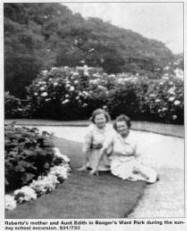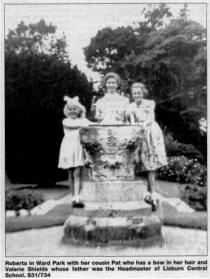
CHRIST CHURCH SUNDAY SCHOOL
Christ Church's first ever Sunday school excursion, is remembered
 ROBERTA
Pithie's recollections of a Sunday school outing to Bangor during her
childhood were inspired by the following article which first appeared in the
journal of the Lisburn Historical Society for December 1978.
ROBERTA
Pithie's recollections of a Sunday school outing to Bangor during her
childhood were inspired by the following article which first appeared in the
journal of the Lisburn Historical Society for December 1978.
It looks back to a much earlier excursion in 1892 which was the first ever organised by the Sunday school attached to Christ Church.
Coincidently, on this occasion the children spent the afternoon at the Ingram Estate at Harmony Hill where Roberta grew up.
"On Saturday afternoon July 30th, the first trip of those attending the afternoon Sunday schools in connection with Christ Church, Lisburn took place. Assembly was at the Nicholson Memorial Schoolhouse at 2pm. Refreshment tickets were distributed to those entitled and the procession of school children was lined up in the following order Infants Sunday School, Senior School, Blaris School and Deneight School.
There were 450 Sunday School scholars, 40 teachers and other friends, and the Lisburn Conservative Flute Band led the procession through the town.
At 2.30pm the band playing marching music could be heard as they all set off for 'Ingram' on Harmony Hill.
In the front of the scholars a handsome banner was borne, which had an open Bible as the centrepiece with 'Christ Church Sunday School' across the top and 'The Bible Our Guide' at the bottom.
Flags and bannerettes with religious texts were distributed at intervals along the ranks, and to be chosen to carry one of these was a delight and an honour.
With the music playing, the sun shining down on the happy children and the flags flying it was a day to remember.
Friends and relatives lined the route from Market Place to Harmony Hill and weren't the children glad to see them smiling and waving as they passed along.
On their arrival at 'Ingram' (Johnson Smyth's House, Harmony Hill), where Miss Corken had placed her large fields at the disposal of the schools, the children were soon disposing of the-refreshments, and then away helter-skelter to enjoy the swings put up the previous evening.
The football, cricket and races for prizes were a most popular item.
A Mr T H Cronne had a number of balloons which he released at intervals to shrieks of delight and cheers from the children as they sailed over the fields.
At six o'clock tea was served and thoroughly relished by the young people after all the exercise they had been having.
Parents of the children were now taking part in the enjoyment and were keeping a special eye on the infants, some of whom were tired out running around.
Miss Corken, Mrs and the Misses Johnson Smyth's were present all afternoon and hospitably entertained many of the visitors at 'Ingram House'.
For their generosity and kindness thanks was returned by the Rev. A J Moore and it was carried by enthusiastic cheers.
At 7.30pm the procession was reformed and marched back through the town to the Nicholson Memorial School where after some votes of thanks the Doxology was sung, and all dispersed to their homes having spent a very happy and enjoyable afternoon.
On the same afternoon the Sunday Schools in connection with the Cathedral had their annual trip, the place chosen being Laurel Hill, Ballymacash.
Alas and alack times have changed, the fields mentioned on Harmony Hill are covered with dwellings, the Johnson Smyth's are but a memory, their big house gone. The name Harmony Hill remains. Someone asked me where did the name come from? I don't know. Just a lovely name someone thought of.
ROBERTA RECALLS A SUNDAY SCHOOL EXCURSION OF YESTERYEAR
Didn't we have a lovely day'
IN today's world where many children take at least one annual two week holiday abroad for granted, it's hard to imagine a time when a day trip to the seaside was eagerly anticipated for weeks in advance.
But 50 years ago circumstances were very different as people lived strictly within their mean and in mans instances that meant no holiday at all.
For the majority of children the annual Sunday School excursion provided one of the few opportunities each year to venture beyond their own locality.
Moira woman Robert Pithie can remember such trips very well.
In the late 1940's and early 50's she was a child living in a cottage on the Ingram Estate at Lambeg which was then owned by the Johnston-Smyth's.
This week she recalls one such outing to Bangor organised by the Sunday School a Lambeg Parish Church.
"During the late 1940 and early 50s money among the working class was scarce.
Clothes for adults and children alike were quite often hand-me-down from better off relatives or employers.
Food was plain but wholesome and not to be wasted. Vegetables where possible, were home grown and bread home baked.
Holidays were definitely for the upper class There were family carp only in
the well to do families and an outing to the seaside was a once a year
treat.
Therefore the big trip o the year was the Sunday School excursion.
The Sunday School to which I belonged in Lambeg Parish Church took the pupils free of charge thanks to a fund provided by the late Sir Milne Barbour of Conway. A small amount was charged for adults.
I got my ticket at Sunday School about a week before the big day.
This ticket was like gold in my hand. It was brought home carefully and put in a safe place.
During the week preceding the trip I thought, ate and slept the outing.
When I heard the adults discussing the weather for the weekend and referring to rain and grey skies I was plunged into misery.
However Saturday dawned mistily and I set off to Lambeg station with my mother who carried in her shopping bag all that might reasonably be required for a day in Bangor.
At the station we met up with Aunt Edith and cousin Pat and other friends and made up a happy excited group.
The train (a real one with steam) arrived in due course and all piled on board.
During the journey invariably some smart alec pupils always put their heads out of the windows and got covered in sooty smuts.
"One, regarded as a bit of a hero, got coal in his eye and had to go to Bangor hospital to have the coal removed.
Eventually the train steamed into Bangor and by this time the mist had lifted and glorious sunshine bathed the town.
The morning was usually spent on the little piece of sand at the bottom of the town where the Marina is now, and this was handy for the sandwiches and tea served at lunch time in the church hall at Hamilton Road.
Believe me every crumb was eaten as there was no spare money for meals in cafes.
The real day started after this - the walk to Ballyholme beach and then down on to the sand.
Towels were spread and bathing costumes, usually borrowed, were put on and then it was into the sea.
I do remember one year having a knitted Costume which had started life as the body of a butterfly as part of a ballet costume.
When the costume got wet the weight of the wool took over, as it were, and the costume dropped like a stone. Off it had to come and I had to be content with my dress tucked into my pants so that I could paddle.
Those afternoons seemed to stretch for ever - nobody got bored or fed up as seems to be the modern trend. It was like heaven on earth.
Eventually as the tide started to come in everyone got dressed with much hiding behind towels and the trek back to Bangor, and the church hall, got under way.
Fun was had all the way along the road, every minute was enjoyed. Once more the refreshments were devoured and it was off out again.
Usually at this time we all went to Ward Park. Here we played on the swings, fed the ducks, and I seem to remember that there was a mini zoo.
Then as the shadows lengthened we all made our way to the station.
The train journey home was usually held up by the late comers who rushed up the platform to the cheers of the passengers.
I remember my Aunt Agnes and her friend Mrs Matheson were invariably among the last to arrive and it was not unknown for the Minister to have to go and look for them.
I remember them getting stuck in the revolving doors in the Slieve Donard Hotel but that's another story.
On the way home the day was recalled over and over again by excited children all trying to tell their stories at the same time.
When we all parted company at Lambeg station, sunburnt and happy, it was with memories of a day so precious that it could never be matched with today's package holidays. Perhaps the simple life, lived in an age of innocence was so much better. I think so anyway."
